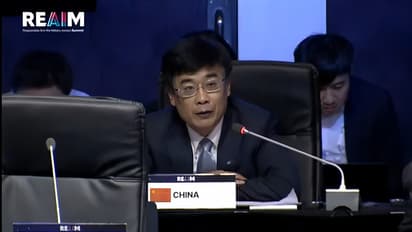China refuses to sign agreement banning AI from controlling nuclear weapons at Seoul Summit

Synopsis
China has opted out of the "Blueprint for Action" agreement aimed at preventing artificial intelligence (AI) from controlling nuclear weapons, an initiative adopted at the Responsible AI in the Military Domain (REAIM) summit in Seoul on Tuesday.
China has opted out of the "Blueprint for Action" agreement aimed at preventing artificial intelligence (AI) from controlling nuclear weapons, an initiative adopted at the Responsible AI in the Military Domain (REAIM) summit in Seoul on Tuesday. The summit, which brought together over 100 countries including the United States, sought to address the increasing integration of AI in military systems and the ethical implications associated with its use.
The agreement, while not legally binding, emphasizes the need for continued human involvement in all decisions related to nuclear weapons deployment. It asserts that human control is essential to maintain ethical and responsible oversight of such systems. According to the declaration, AI applications in military operations "should be ethical and human-centric," ensuring that advanced technologies do not replace human decision-making in critical areas, particularly when dealing with nuclear arsenals.
Despite widespread support for the measure, China’s decision to abstain from the agreement signals a reluctance to commit to international guidelines that limit the role of AI in nuclear command and control systems.
South Korean defense minister Kim Yong-Hyun, addressing the summit, acknowledged the transformative potential of AI in modern warfare but warned of the dangers associated with its misuse. “As AI is applied to the military domain, the military’s operational capabilities are dramatically improved,” he said. “However, it is like a double-edged sword, as it can cause damage from abuse.”
The rapid adoption of AI technologies has sparked concerns about the ethical and safety risks involved, especially when it comes to autonomous decision-making in high-stakes environments like nuclear warfare.
One notable aspect of the summit’s declaration is the absence of any specific sanctions or penalties for nations that violate the agreement. The document acknowledges that while AI technologies are advancing rapidly, global policies and regulations governing their military use have not kept pace. Further discussions will be necessary to establish clear, enforceable frameworks to regulate AI in the military.
The need for more robust measures was highlighted by several participants, who stressed that international cooperation and oversight are crucial to prevent potentially catastrophic consequences.
The Seoul summit was co-hosted by South Korea, Britain, the Netherlands, Singapore, and Kenya. Building on the inaugural REAIM event held in The Hague in February last year, the summit aims to position itself as the "most comprehensive and inclusive platform for addressing AI in the military domain." The event is part of an ongoing effort to develop global consensus on how to manage the role of AI in warfare, particularly as nations ramp up their use of autonomous technologies.
Russia was notably excluded from the summit due to its ongoing invasion of Ukraine. The exclusion aligns with broader international efforts to isolate Moscow over its military aggression and signals a growing divide between Russia and other nations on issues of military ethics and international security.
While the adoption of the "Blueprint for Action" by many countries marks a significant step forward in addressing the risks of AI-controlled military systems, China's decision to opt out leaves a major player outside the framework. Experts say this could complicate future discussions on the global regulation of AI in warfare, particularly as China continues to develop its own advanced military technologies.
Check the Breaking News Today and Latest News from across India and around the world. Stay updated with the latest World News and global developments from politics to economy and current affairs. Get in-depth coverage of China News, Europe News, Pakistan News, and South Asia News, along with top headlines from the UK and US. Follow expert analysis, international trends, and breaking updates from around the globe. Download the Asianet News Official App from the Android Play Store and iPhone App Store for accurate and timely news updates anytime, anywhere.